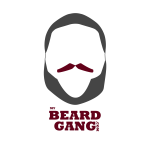Hormones for Beard Growth: Right in here, we are going to be discussing extensively, the major hormones for beard growth, as well as the various supplements that can be used to improve these hormones.
So, having known that, let’s get down to business!
Basically, 4 out of every 5 men with a completely bald or slightly bald jaw, complain tirelessly about their inability to grow a proper and healthy beard. However, do you know that approximately only 2 out of these 4 get the right solution to their complaints at the right time without having to have tried lots of myths recommended by ignorant people like them who claimed to have known more? And I’m afraid you’re amongst the 2 who doesn’t fall into this category.
You’re lost? Don’t be. I’ll explain even better.
In simple terms, my conclusion is, lots of men out there, perhaps you inclusive, have gotten extremely wrong information as regards their inability to grow a healthy beard. And in most cases, this information has caused them to lose quite a whole lot of bucks.
You seem to understand better now right? Fine!
However, irrespective of any information you might have gotten, and the places you might have gotten them from, the truth and fact still remains that, the principal factors which determine the level of your beard growth and how healthy and appealing it would be to the sight, are the levels of certain hormones present in your body. A high level of these hormones in your body simply means a rapid beard growth, and otherwise takes the result vice versa.
Thus, in this article, prior to my research, I’d be giving detailed notes on the different major hormones for beard growth, as well as the various supplements that can be used to improve these hormones.
What Then Are the Major Hormones for Beard Growth?
Basically, there are two major hormones for beard growth present in human bodies. However, according to thorough researches, one of these hormones is found inside the other.
Don’t get confused yet. Keep reading, you’ll get to understand it better, sooner or later in this article.
Thus, these two hormones are;
- Testosterone
- Dihydrotestosterone (DHT)
Testosterone
Testosterone as a hormone (I do not know if any other thing called Testosterone exist. Lol) is found both in human bodies and other animals too. So, don’t get to think this hormone exist only in human bodies.
In humans, both the male and female gender possess the testosterone hormone. In men, the testicles primarily make the testosterone, while in women, their ovaries do, and usually in small quantities.
However, since this article is primarily for men, I’d be focusing more on testosterone of men. So let’s ride!
In men, testosterone produces at a high rate right from the puberty stage and starts to dip once you attain the age of 30 to 35.
Now, I’d like to add; the testosterone is usually associated with sex and inarguably plays a vital role in the production of the sperm cells. However, asides this, here, I’d want you to know that the testosterone also affects the bones and muscles, the production of red blood cells in the body, the storage of fat in the boy, a man’s mood, and most importantly, the cause of this article; it affects the rate at which a man’s beard grows.
A high level of testosterone in the body reduces the tendencies of baldness and simultaneously acts as a catalyst during the production of facial hairs.
However, reduced production of testosterone could occur in human. This is not totally drastic, although it has a few severe effects on such an individual. This condition is generally known as hypogonadism. Also, this ailment or disease as the case may be, doesn’t necessarily need treatment.
Wondering what might be the cause of the low production of testosterone?
Well, age plays a major role. And as mentioned earlier in this article, the older you grow, the lower the rate of production of testosterone in your body system. However in addition to aging, sometimes, low level of testosterone could be as a result of pituitary gland problems.
Asides all these as well, diseases such as; AIDS; Kidney disease; Alcoholism; Cirrhosis of the liver are various causes of the low level of testosterone in the body. In other words, most importantly, if you desire to grow blossoming beards, try as much as possible to reduce your degree of alcoholism.
Now, as I said earlier; the second hormone is found inside the first hormone. Remember me telling you, you’d understand it soon, right? This is it;
A certain kind of steroid is found inside the testosterone which as well serves as major hormones for beard growth. It is called dihydrotestosterone (DHT).
Dihydrotestosterone (DHT)
So, what is DHT?
Basically, DHT is a sex steroid which is produced in the gonads, most of which have a particular physiological action. Well, that’s not what we need.
Asides being a sex steroid, DHT is an androgen hormone. And voila! That’s exactly what we need, and thus, what we’ll be dealing with.
Now, what are ANDROGENS?
Androgens are what are solely responsible for various biological characteristics of every male. These characteristics include the deeper voice noted in males as they grow older, increased body mass and structure, and most importantly (cause of the subject matter of this article) the body hair.
Although the hair on the head would grow even with a drop of DHT in the body, every other hair found in any other part asides the head requires a substantial amount of DHT before they can blossom. This thus draw us to a conclusion; DHT is essential for the growth of hair in every part of the body asides those growing on the head. This thus accounts for the reason fully and perhaps excessively (beards can’t be in excess for a member of beard gang though) tend to get bald.
That is, for reasons I myself doesn’t fully understand yet, the more the DHT in your body, the less the amount of hair you can grow on your head, and simultaneously, the more amount of beard you can grow. In other words, DHT is detrimental to head-hair growth.
Thus my conclusion as regards DHT in this article, men with high levels of DHT in their reproductive systems will automatically have evidently more facial hair than other men who have lower levels of DHT. Hence, if you have a body system that’s very sensitive to this hormone – DHT & Testosterone, then you’re prone to growing beard at a very early stage in life.
However, if you’re finding it hard to grow a beard even when already in your late twenties up to your thirties, then by now, you should know your body doesn’t produce just enough Testosterone and DHT.
Thus, before bringing this article to a close, let’s quickly talk about a few supplements that would improve the production of these hormones in your body system.
Supplements to Improve the Major Hormones for Beard Growth
Velvet Bean
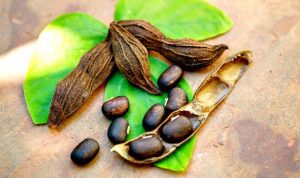
Velvet Bean is a popular herbal supplement which has gained trust by proving to be of maximum importance by the pharmaceutical industry. Mucuna Pruriens is the botanical name of Velvet Bean.
Mucuna Pruriens has loads of benefit for hormones – especially the DHT & Testosterone – the major hormones for beard growth.
You see, velvet bean contains high amounts of levodopa. This is a compound which converts quickly into dopamine in the body. This conversion, according to various studies, has proven to increase the testosterone levels in the body by 40%.
Other further studies have also shown to us that levodopa present I velvet bean can also act as a receptor of androgen, which helps in co-activating proteins in the body, thus leading to an improvement in the beard growth rate of such person – everything being equal.
Sorghum
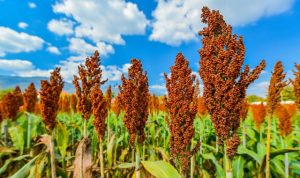
Sorghum with the botanical name, Sorghum Bicolor is as well an ancient herb which grows mainly in the African continent.
Out of all studies, as regards Sorghum Bicolor, there’s a particular one which stands out as a chief indicator of the herb’s relevancy. This study shows that for every sorghum extract consumed, the levels of the enzyme; 5-a reductase by 54%.
Now, what’s the 5-a reductase, and its importance and relevance to beard growth?
Well, quite simple and straightforward.
5-a reductase is a kind of enzyme which converts testosterone into DHT. Wait, did I mention that DHT is a more active and potent beard growing hormone than testosterone?
Well, if I didn’t, I’ve just done so.
Hence, it simply means, that the 5-a reductase converts a beard growing hormone to an even more efficient and potent beard boosting one. Simple! I guess you can see for your eyes the great importance sorghum provides as regards growing a blossoming beard.
Creatine
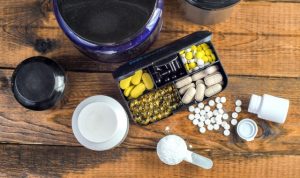
If you’re a weightlifter, then creatine shouldn’t be a new thing to you. Research has proven, that after protein powders, creatine is the next most popular supplement used for the promotion of lean mass, and also to gain strength.
Aside all these importance, creatin is an efficient beard growth supplement, which aids a higher production of the major hormones for beard growth. Creatine has been confirmed to help in increasing the levels of testosterone and DHT present in a body system.
Glycine
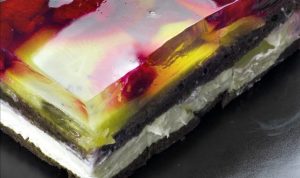
Glycine is an amino acid. As and now, it is the purest known protein present in the human body.
Basically, the main function/importance of glycine is its ability to help promote one’s quality of sleep, and also helps in reducing the amount of time it takes one to fall into a sound sleep. Thus, confirming it to be an inhibitory neurotransmitter.
However, asides these above-mentioned functions, glycine helps in increasing the 5-a reductase enzyme (although not as much as sorghum), thereby stimulating the conversion of testosterone to DHT, which in turn leads to the promotion of the amount of hair growing on the facial area of the body.
Multivitamin

Truth be told, the greatest supplement for these major hormones for bead growth are multivitamins.
Why?
This is because hair follicles make use of vitamins and rich minerals as a building block towards producing a nicely blossoming beard.
Also, the human body also uses these same vitamins and minerals to produce testosterone, which is further converted into DHT by the enzyme 5-a reductase.
However, taking multivitamins doesn’t mean your beard would grow overnight. No. it’s not black magic. It doesn’t just add hair to your face like that. Instead, it nourishes and helps the required hormones for the healthy growth of your beard. It functions in such a way that it ensures every micronutrient level in your body system are topped up, and every other thing your body needs in other to grow a beard are supplied to the body.
Vitamins like vitamin D, when added to the body using a low-dose vitamin D supplement, it increases the testosterone levels of the body by 25% in a year. Also a Vitamin E supplement also acts as a beard growth accelerator cause of its ability to stimulate the production of testosterone in the body.
Calcium, magnesium, zinc, etc. supplements are also useful in stimulating the production of these major hormones for beard growth present in the body system. In fact generally, all these minerals can be referred to as beard enhancers.
Conclusion on Major Hormones for Beard Growth
So this is how I’d be bringing this article to a close. It’s really being a log ride dissecting the topic – “Major Hormones for Beard Growth and Supplements to improve them.”
I know this article would have helped in a way or the other, hence, please help that friend of yours who’s struggling to grow a beard too, by sharing this article with him.
However, should you have any questions, reservations, or any information that I missed out, please feel free to share them with me via the comment section? I’d love to have your thoughts, opinions, and yes! Your testimony!
Till then, keep bearding!
